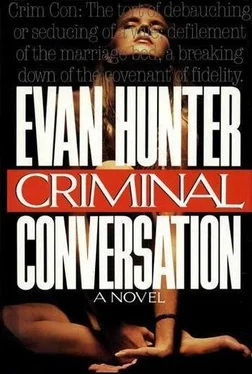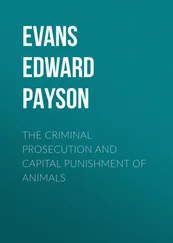“Why don’t you call me?”
“Okay. You’d better be alone.”
“I’ll be waiting.”
“Me too.”
“I love you.”
“I love you too,” she said.
“Later,” he said, and hung up.
There was laughter down the hall.
The place was so empty, it seemed to echo. About all that was happening in the criminal courts this week were a handful of arraignments in AR One and AR Two, and the processing of new arrests in the Complaint Room. Aside from a skeleton staff necessary to keep the wheels of justice barely grinding, the big gray complex on Centre Street was virtually devoid of personnel. Michael sat alone before the computer in the sixth-floor office. The calendar on the wall read December 28, the digital clock on his desk read 6:37 p.m. He’d give it a few more hours and then quit for the day, take a taxi uptown to Spark’s for a good steak. He felt as if he were the last man alive in a city demolished by the bomb. The laughter down the hall was gone now. There was the click of high-heeled shoes on the marble floor outside, fading. He turned back to the screen again.
Not all of the Faviola tapes had been computerized. There were more than eight thousand hours of conversation, and of these only a bit more than half had been transferred to computer disks since the trial ended this past August. The process was somewhat lackadaisical. Before the trial, the U.S. Attorney had incessantly sifted and resifted each and every conversation. The accumulated evidence had been used to send Anthony Faviola away forever, but there was nothing more that could be done to him. In fact, when Michael made his call to the Feds, they’d asked him what the hell he wanted with all that stuff? He told them he was doing background research, and they’d let it go at that. No one had expected any real explanation; everyone in law enforcement was well aware of the keen competition among agencies. Which was one of the reasons Sarah was in the Caribbean and Michael was here in New York looking for any reference to a person named Lena.
I’ll see what I can do , Palumbo had said. I’ll talk it over w ith Lena, and get back to you. That’s the best I can say right now. No promises.
Everyone in the DA’s Office felt certain that the moment Anthony Faviola got sent west, his younger brother, Rudy, took over as the new boss of the family. But Palumbo hadn’t said he’d talk it over with Rudy. In fact...
Michael switched on the tape again.
“ Rudy, huh? ”
“ If you could talk to him ...”
“ Where you been, Jim? ”
“ What? ”
Something derisive in Palumbo’s voice.
Where you been, Jim?
And then saying he’d talk it over with Lena.
So who the hell was Lena?
Frankie Palumbo was married to a woman named Grace. He had two daughters, one of them named Filomena — after his mother — and the other named Firenze, after his grandfather’s birthplace in Italy. Frankie was fifty-two years old and had never been to Italy, big surprise. There was no one named Lena in Anthony Faviola’s family. Nor in Rudy’s. Not a Lena in the carload.
So who is Lena, what is she? Michael wondered. And what the hell am I doing here in New York three days after Christmas, chasing Mafia ghosts on a computer, because my boss, my own personal boss of all bosses, thinks that if Rudy Faviola is not currently running the show, then we’d better learn damn fast who is.
Lena.
Michael fantasized a voluptuous dark-haired woman of indeterminate Mediterranean origin. Lena. And the swan? Oh? No kidding? In college, before he’d met Sarah, his taste had run to poetry and to dark-haired women... well, even though he’d known better, he’d still thought of them as girls , actually. He was now thirty-six, this was back during the seventies; Betty Friedan had published her Feminine Mystique a decade earlier, and Erica Jong had just begun telling the world about her ten thousand and one orgasms.
Michael was twenty-one when he met the first blonde he’d ever dated, the last girl — or even woman — he’d ever date again because that blonde happened to be a nineteen-year-old junior named Sarah Fitch whom he married a year later, after he’d graduated with his B.S. degree, and while she was still in her senior year. His parents helped him through law school — it was a matter of pride that he’d later repaid them every cent — until Sarah herself graduated with a B.A. and got a license to teach English, which she’d done here and there all over New York while he trudged uptown to Columbia. She still taught at the Greer Academy, where she’d settled in some eight years ago, after getting her master’s from NYU. He was always surprised when a woman obviously in her late twenties stopped “Mrs. Welles” on the street and told her how much she’d enjoyed being in her class. Well, Sarah was thirty-four now. She’d started teaching when she was twenty-three; those sixteen-year-olds back then were now in their late twenties.
Lena.
Maybe it wasn’t a woman’s name at all. No woman behind the throne here, no woman whose advice was earnestly sought. Maybe it was a man’s family name, maybe the Lena with whom Palumbo had to talk it over was a Johnny Lena or a Joey Lena or a Foonzie Lena. If so, had his name ever cropped up in the hundreds of conversations between the Brothers Faviola at all hours of the day and night? Many of these conversations were in crude code. The mob was ever alert to the marvels of electronic surveillance. When they weren’t talking what sounded totally innocuous to anyone listening but which obviously had great import to the chatterers themselves, they were turning on record players or water taps or showers or television sets to obscure whatever they were saying in plain English laced with a few bastardized Italian expressions like boff-on-gool and stroon-zeh and mah-nedge and jih-drool and mool-een-yahn. The U.S. Attorney had nailed Faviola on four murders because he’d been stupid enough to believe the place he was calling from was inordinately safe: his mother’s house in Oyster Bay. Who would have thought those sfasciumi could have got into Stella Faviola’s fortresslike, fenced-in, gray stone mansion on the North Shore, there to install their insidious listening devices?
Lena.
Earlier this evening, Michael had kicked up FAVIOLA, RUDYon the computer, and then he’d typed in LENAand hit the SEARCH key, and lo and behold there was not a single LENA, uppercase or lower, to be found. As a lark, he’d typed in LEDAand hit the same search key, and got nothing there, either, small surprise. This meant that in none of Rudy’s conversations with his brother had the name Lena, or for that matter Leda, been uttered — at least not on the tapes that had already been computerized.
Michael was praying there’d be something on the computer. He did not relish wading through thousands of pages of typed transcript, reading the remainder of the conversations word for word.
He decided to go straight for the jugular, do a wider search of the entire file, which was broken down into month-by-month folders starting in September of 1991, when the federal surveillance had begun in earnest. He called up each folder in turn, scanning them for the name Lena. Nothing for September or October of ’91. Zilch for November. Lots of Christmas talk in December, and a few near misses when the computer gave him first polenta , and then lenona , both of which contained the letters l-e-n-a in succession — close but no cigar. He went back to the drawing board, clicked the little box for Exact Match, and typed in the name with a capital Lfollowed by the letters e, n, and ain lowercase. Lena. Once more unto the breach, dear friends.
Читать дальше











